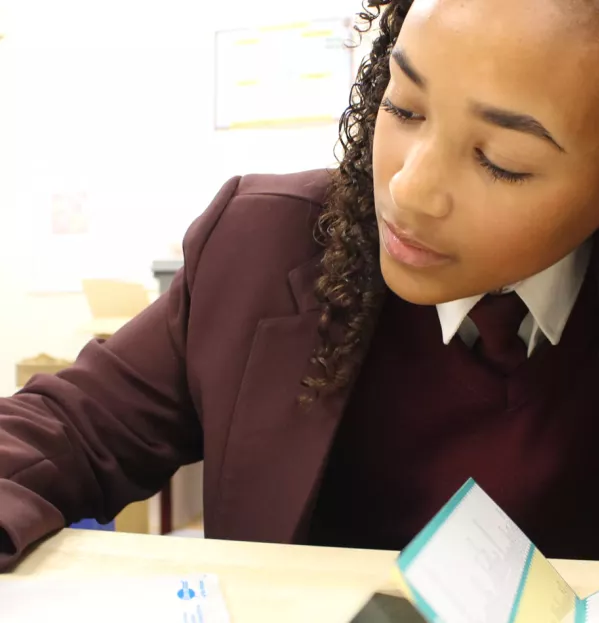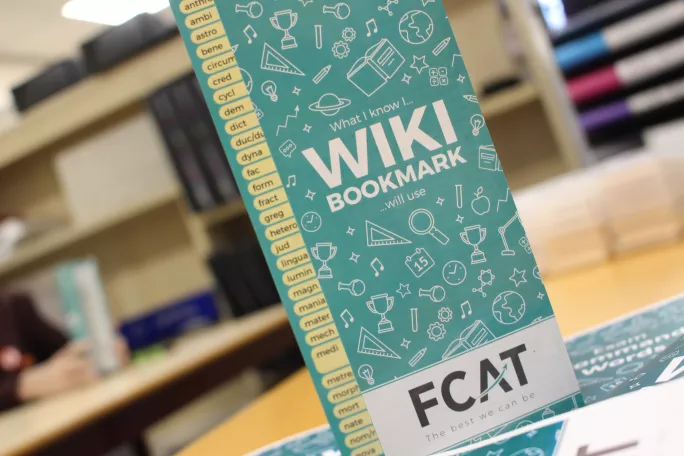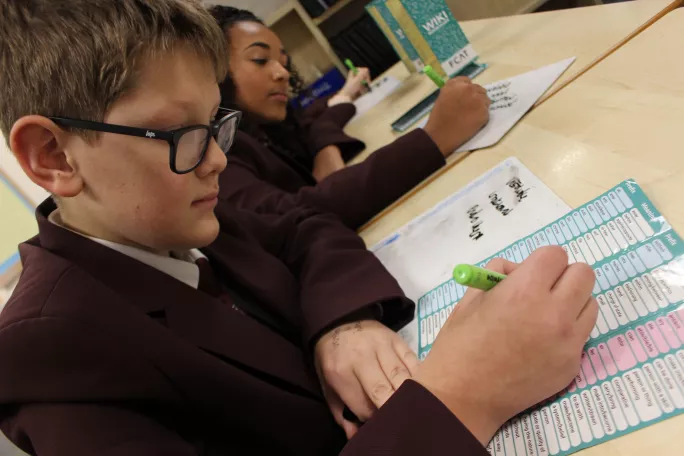- Home
- Teaching & Learning
- General
- Could this be the way to boost students’ vocabulary?
Could this be the way to boost students’ vocabulary?

For most, bookmarks perform a humble function: they help us open our books to the right page and carry on reading.
At Fylde Coast Academy Trust (FCAT) in Blackpool, however, they are much more than this. There, WIKI (what I know I will use) bookmarks perform a critical task: they increase students’ vocabulary knowledge, and help boost reading skills.
Estelle Bellamy is the English lead at FCAT, and the WIKI bookmarks are her invention.
“Reading is a huge problem in Blackpool. We have a higher than average number of children below the expected standard in literacy, and we know that reading is the key to change,” she says. “We know from the evidence that the pre-teaching of vocabulary is absolutely key to really understanding and improving reading, and this was our starting point at FCAT.”
Historically, the trust used a paid-for literacy intervention programme to improve vocabulary knowledge for those who were struggling. However, it was very expensive and only accessible to a few, says Bellamy.
As a replacement, Bellamy produced the WIKI bookmark, which lists common prefixes, suffixes and root words on it, and trained staff to use them when introducing children to new vocabulary.
From Year 4 onwards, the bookmarks are part of a child’s equipment and go from lesson to lesson with them, meaning that all children have access to a quality teaching tool that focuses on vocabulary.

“More often than not, parts of the word [a pupil is looking at] are on the bookmark. But if they aren’t, children are encouraged to think of different words which have the same prefix, suffix or root word and then begin to piece the word together,” she says.
For example, the word “circumference”. If a child is unsure what it means, they look to see if they recognise any part of it: they may recognise “cir”, which leads to “circle”, and they can start to piece together the meaning of the word.
During lockdown Bellamy and her team created several versions of the bookmark to suit different age groups.
Bookmarks that improve pupils’ vocabulary
They developed a specific bookmark for Year 6, which focuses on common Sats words, and one for Years 10 and 11, which includes common exam language, like command words. The latter includes QR codes, which, when the students scan them, take them to a webpage that explains how that particular word may have a different meaning in different contexts; for example, “draw” may have a different meaning in art and maths.
“This bookmark really trains them to take a pause and think. When they are given any mock exam question or essay title, we encourage them to use the bookmark, and make sure they really understand what the question is asking them to do,” Bellamy explains.
The team also created separate bookmarks for different subjects due to demand from those teachers; maths, science, French, PE, humanities and expressive arts all have their own versions. In some subjects, teachers print a bookmark on an A4 sheet and get the students to stick it in the back of their book. This approach is absolutely fine, says Bellamy - as long as pupils are making use of them, and it’s having an impact in lessons.
Read more:
- How a baseline reading test could transform whole-school literacy
- Three ways to teach vocabulary so it sticks
- Could a rekenrek transform how you teach times tables?
So, just how much of an impact are the bookmarks having?
The initiative has been in place for three years now, and some staff have been sceptical about its effectiveness, says Bellamy.
“I understand that vocabulary isn’t the solution to everything. But fundamentally, if a child can’t access the words in your subject, they are going to really, really struggle,” she explains.
And while concrete evidence to prove the project’s success is so far lacking, Bellamy is working hard to change that. Indeed, her initiative has recently been awarded funding from the SHINE education charity, which encourages teachers to develop teaching and learning innovations.
Bellamy is using some of this funding to conduct a trial into the effectiveness of the bookmarks.
“We are trying to prove three things: that we are increasing competence in reading, spelling and fluency. We are doing tests and controls within our trust and we’ve got our control group school to see how much progress children are making in those three areas. The funding has given us a bit of space to do that and think about that,” she says.

The rest of the funding has gone on designing an intensive intervention that involves reading tutors training the children who are struggling the most to use the bookmarks over six weeks throughout the year. This intervention is happening in some of the trust’s secondary schools but not in primary schools because they are struggling to recruit teaching assistants to deliver it, says Bellamy.
There are other elements still to be ironed out: as the initiative progresses, Bellamy is hoping to create a website that holds all the bookmarks for other teachers to download themselves.
In the meantime, she has some advice for others who are looking to set up something similar in their own schools.
“With any new intervention, you need an implementation plan; you can’t just throw it in there and hope it works. You need student, staff and subject-specific training,” she says.
“Any vocabulary resource also needs to be at hand and be immediate. Primary schools tend to put the bookmarks in a pot in the middle of the table, secondaries have the subject-specific ones stuck in the back of their books or kept in the classroom.
“Beyond that, I’d encourage every school to have a dedicated focus on vocabulary. The research is clear that it can make a huge difference.”
And when her evaluation is published at the end of the year, Bellamy is certain she’ll have the research to back up the use of the WIKI bookmark as a go-to tool.
Estelle Bellamy was one of the winners of last year’s Let Teachers SHINE competition. The competition, which is run by education charity SHINE in association with Tes, awards grants to teachers with innovative ideas to tackle the disadvantage gap
You need a Tes subscription to read this article
Subscribe now to read this article and get other subscriber-only content:
- Unlimited access to all Tes magazine content
- Exclusive subscriber-only stories
- Award-winning email newsletters
Already a subscriber? Log in
You need a subscription to read this article
Subscribe now to read this article and get other subscriber-only content, including:
- Unlimited access to all Tes magazine content
- Exclusive subscriber-only stories
- Award-winning email newsletters
topics in this article



